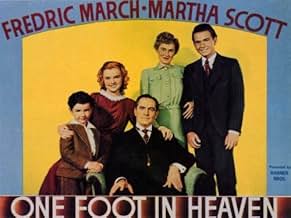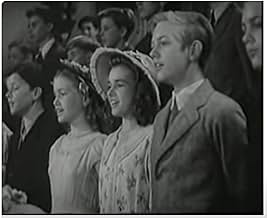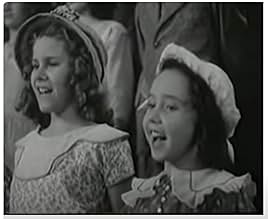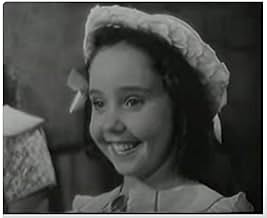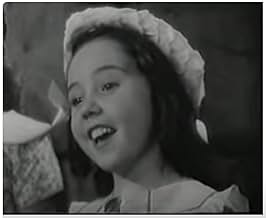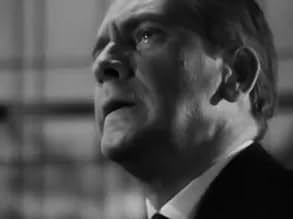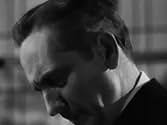IMDb RATING
6.6/10
1.6K
YOUR RATING
Episodic look at the life of a minister and his family as they move from one parish to another.Episodic look at the life of a minister and his family as they move from one parish to another.Episodic look at the life of a minister and his family as they move from one parish to another.
- Nominated for 1 Oscar
- 2 wins & 1 nomination total
Dorothy Adams
- Woman Behind Hope at Baptism
- (uncredited)
Joan Anderson
- Child
- (uncredited)
- Director
- Writers
- All cast & crew
- Production, box office & more at IMDbPro
Featured reviews
For those who are cynical about the religious life, here's a movie which ought to put some of that cynicism to rest. "One Foot in Heaven" is the true story of a Methodist preacher and his family, and it rings true, not just for the humanity Frederic March brings to his role as the preacher, but for the situations and characters that many of us, regardless of creed, will easily relate to. My dad used to say, A church is its people. I think One Foot in Heaven is a perfect illustration of this truth. Though this is a story about a preacher, we aren't preached at. There's a wonderful scene, with the preacher gently urging his agnostic doctor to start coming to church. He doesn't beat him over the head with a Bible but tries a more "humanist" approach.
Someone else has compared One Foot in Heaven with It's a Wonderful Life. Another film to compare is Going My Way. In fact, One Foot in Heaven and Going My Way were released just a year apart. There are story similarities, like the building of new churches (The Bishop's Wife is another example), but it's interesting to see how religion in the community is seen respectively through Protestant and Catholic lenses.
Then, there's the final scene. In some ways it's corny, but it still moves me. It hearkens to a time when religion wasn't sectarian but seamlessly interwoven in community life, unselfconsciously and unostentatiously. It was before the battle lines between religionists and secularists were drawn, when America had a "civil" religion. Alas, a time past.
Someone else has compared One Foot in Heaven with It's a Wonderful Life. Another film to compare is Going My Way. In fact, One Foot in Heaven and Going My Way were released just a year apart. There are story similarities, like the building of new churches (The Bishop's Wife is another example), but it's interesting to see how religion in the community is seen respectively through Protestant and Catholic lenses.
Then, there's the final scene. In some ways it's corny, but it still moves me. It hearkens to a time when religion wasn't sectarian but seamlessly interwoven in community life, unselfconsciously and unostentatiously. It was before the battle lines between religionists and secularists were drawn, when America had a "civil" religion. Alas, a time past.
This enduring classic is one of those films you can start at 12 midnight and watch all the way through without dozing off for a second. There are no dazzling special effects, no edge-of-your seat car chases or mid-air rescues.However,its engaging procession of honest scenes depicting the often overwhelming, though eventually rewarding, trials of a man of God during the first half of the twentieth century rival the greatest of superficial,high-tech thrills today's blockbusters have to offer. From the early scenes of Mrs.Spence trying valiantly to adjust to the squalor of her parsonages to Dr.Spence's creative solution to the adult choir's intolerable dissonance this film is a radiant beacon in a bleak world bereft with terrorism, wars, and rumors of wars due to its straightforward, heartfelt depiction of faith under fire. Though obviously filled with references to Methodist doctrine the film does not alienate members of other denominations and even nonbelievers can see this as an excellent example of how old-fashioned values triumph over hypocrisy and ignorance in turbulent times. Unfortunately, this movie is unbelievably rare and only pops up on TCM once in a blue moon. I
ONE FOOT IN HEAVEN is a wonderful story of what it takes to not only endure the difficulties in being a minister; but how these problems build character.
Year after year of allowing church bosses and bullies to dictate what will and won't be allowed, the minister finally learns how to beat them at their own game.
It has so many touches of warmth, in which a subliminal message of truth is going on coupled with hints of blackmail and leverage.
When Dr. Spence refuses to name his own son Wm. Spence, Jr. because he says, "Junior is a sissy name and I won't have my son being a sissy!" his wife decides to coerce him by holding back on the cooking of dinner until he gives in to her wishes. Thinking she's won, he says he'll name the baby in church next Sunday. As he asks for the name and she announces to the congregation, "William Spence, Junior," he repeats it as "William Frasier Spence" ("named after my grand old Scottish Uncle Frasier--and I don't mean the one who was hanged as a horse thief!")
It is this war of wills that carries the story; making each episode build to the next one. Tempered with touches of right and wrong, it is a classic! A must see! Good conflict, good story line.
Nominated for an Academy Award for Best Picture.
Year after year of allowing church bosses and bullies to dictate what will and won't be allowed, the minister finally learns how to beat them at their own game.
It has so many touches of warmth, in which a subliminal message of truth is going on coupled with hints of blackmail and leverage.
When Dr. Spence refuses to name his own son Wm. Spence, Jr. because he says, "Junior is a sissy name and I won't have my son being a sissy!" his wife decides to coerce him by holding back on the cooking of dinner until he gives in to her wishes. Thinking she's won, he says he'll name the baby in church next Sunday. As he asks for the name and she announces to the congregation, "William Spence, Junior," he repeats it as "William Frasier Spence" ("named after my grand old Scottish Uncle Frasier--and I don't mean the one who was hanged as a horse thief!")
It is this war of wills that carries the story; making each episode build to the next one. Tempered with touches of right and wrong, it is a classic! A must see! Good conflict, good story line.
Nominated for an Academy Award for Best Picture.
Being a preacher's kid is never easy. I was one, and so was my wife. This movie portrays in dramatic ways the humanity and humour of being a preacher's family living essentially on hand outs and never quite having the perfect home for the kids. I can relate to Hartzel, the eldest son. Like him I wished my Dad could have been anything else but a preacher. Like Hartzel I found out in many situations just how much Dad would go through for us.
This movie is nostalgic in many ways. It hearkens back to a time when values like vision, and sacrifice were highly esteemed, and were going the extra mile was not an option but an expected way of life. Sometimes, when I look back, I rewind this video and watch it.
It is a human story, wrapped up in the faith of a man and his family, who laid hold of a dream to make God real in every facet of life, and to show people that God cares about all of us. It is a story of trial and adversity and perseverance and triumph. In the end it is not the glory and accolades of man that matter, but of having lived a life well lived and full to brim.
The cast of this film is perfect and very believable. Some of the characters I have known personally in different churches my father pastored. It is as if they are in every congregation. The issues of never owning a home or being able to decorate as you please, or not having enough groceries, and even the leaky roof over our heads, all resonate. I have lived through them myself. These things really happened to the circuit preachers and those who went and started new churches. These things still happen.
It is a good script, and is not in conflict with the book. The book is well worth the read as well. I have both the movie and the book. It sits amongst my most prized possessions.
You will find yourself laughing, you will shake your head in disbelief, you will get ticked off, but in the end you will find yourself appreciating and loving this very human family that attempts to keep loving and keep living out what they believe, to love God and to love your neighbour as yourself.
This movie will reveal just how much and how full a life can be, and how meaningful it is to serve others. Gayle Sayers the Hall of Fame running back of the Chicago Bears said, "God first, others second, myself third." This is exactly what this movie is about. Getting the priorities right and living life to the full.
This movie is nostalgic in many ways. It hearkens back to a time when values like vision, and sacrifice were highly esteemed, and were going the extra mile was not an option but an expected way of life. Sometimes, when I look back, I rewind this video and watch it.
It is a human story, wrapped up in the faith of a man and his family, who laid hold of a dream to make God real in every facet of life, and to show people that God cares about all of us. It is a story of trial and adversity and perseverance and triumph. In the end it is not the glory and accolades of man that matter, but of having lived a life well lived and full to brim.
The cast of this film is perfect and very believable. Some of the characters I have known personally in different churches my father pastored. It is as if they are in every congregation. The issues of never owning a home or being able to decorate as you please, or not having enough groceries, and even the leaky roof over our heads, all resonate. I have lived through them myself. These things really happened to the circuit preachers and those who went and started new churches. These things still happen.
It is a good script, and is not in conflict with the book. The book is well worth the read as well. I have both the movie and the book. It sits amongst my most prized possessions.
You will find yourself laughing, you will shake your head in disbelief, you will get ticked off, but in the end you will find yourself appreciating and loving this very human family that attempts to keep loving and keep living out what they believe, to love God and to love your neighbour as yourself.
This movie will reveal just how much and how full a life can be, and how meaningful it is to serve others. Gayle Sayers the Hall of Fame running back of the Chicago Bears said, "God first, others second, myself third." This is exactly what this movie is about. Getting the priorities right and living life to the full.
Warner Bros. 1941 "One Foot in Heaven" was an inspired film. Based on a real person, William Spence, and adapted the from the biographic book by his son, Hartzel Spence, showed a truly rare individual who gave up his own medical ambition when he heard the call to serve as a Methodist minister. Directed by Irving Rapper, and with a musical score by Max Steiner, it was a crowd pleaser that continues to capture new friends, even today.
The success of the film lies on the fantastic portrayal of William Spence by Fredric March, who was at the height of his career. The character of Mr. Spence comes across as a no-nonsense man who must deal with the narrow mindedness of the small Iowa community he is sent to. Coming with his young wife, Mr. Spence was not prepared for what he would find in Laketon. The beautiful Hope, who came from another world feels inadequate in dealing with the church ladies who come to help her.
Mr. Spence gave his life to the town that didn't want any changes in their lives. When he proposed a new church to replace the older one, he meets the resistance of the elder moneyed classes. When they turn against him, they use every tactic, including slander to get him to his knees, but fortunately, he knew better. At the end, he was successful in giving the town what he envisioned was his contribution to the community where he spent his life.
Mr. March's performance is key that brings the action together. Lovely Martha Scott plays Hope Spence with dignity. The amazing supporting cast is wonderful. Gene Lockhart, Beulah Bondi, Moroni Olsen, and Grant Mitchell, among others do excellent job, something that was a hallmark of the Warner films of the time.
The success of the film lies on the fantastic portrayal of William Spence by Fredric March, who was at the height of his career. The character of Mr. Spence comes across as a no-nonsense man who must deal with the narrow mindedness of the small Iowa community he is sent to. Coming with his young wife, Mr. Spence was not prepared for what he would find in Laketon. The beautiful Hope, who came from another world feels inadequate in dealing with the church ladies who come to help her.
Mr. Spence gave his life to the town that didn't want any changes in their lives. When he proposed a new church to replace the older one, he meets the resistance of the elder moneyed classes. When they turn against him, they use every tactic, including slander to get him to his knees, but fortunately, he knew better. At the end, he was successful in giving the town what he envisioned was his contribution to the community where he spent his life.
Mr. March's performance is key that brings the action together. Lovely Martha Scott plays Hope Spence with dignity. The amazing supporting cast is wonderful. Gene Lockhart, Beulah Bondi, Moroni Olsen, and Grant Mitchell, among others do excellent job, something that was a hallmark of the Warner films of the time.
Did you know
- TriviaWilliam S. Hart was the guest of honor at the Hollywood premiere of this movie, since his movie The Silent Man (1917) figures prominently in the plot.
- GoofsAt the beginning of the movie, William Spence (Fredric March) announces he has been "called" to the church and will become a pastor in the Methodist Church. His soon-to-be mother-in-law, Mrs. Norris (Nana Bryant)), replies that she would have preferred that he'd joined the Episcopal Church. At that time, in Canada, the dominant church was the Church of England, not the Episcopal Church. That is predominantly a US institution born out of the American Revolution.
- Quotes
William Spence: [to his son, Hartzell] A pastor's family are in a special category. We are uh... Well, It's as if we walked a sort of tightrope. Balancing with one foot on earth and one foot already in heaven.
- ConnectionsEdited into Happy Times and Jolly Moments (1943)
- SoundtracksThe Children's Prayer
(uncredited)
from "Hansel and Gretel"
Music by Engelbert Humperdinck
Libretto by Adelheid Wette
Sung by the Robert Mitchell Choir
Details
- Release date
- Country of origin
- Language
- Also known as
- Con un pie en el cielo
- Filming locations
- Production company
- See more company credits at IMDbPro
- Runtime
- 1h 48m(108 min)
- Color
- Aspect ratio
- 1.37 : 1
Contribute to this page
Suggest an edit or add missing content


